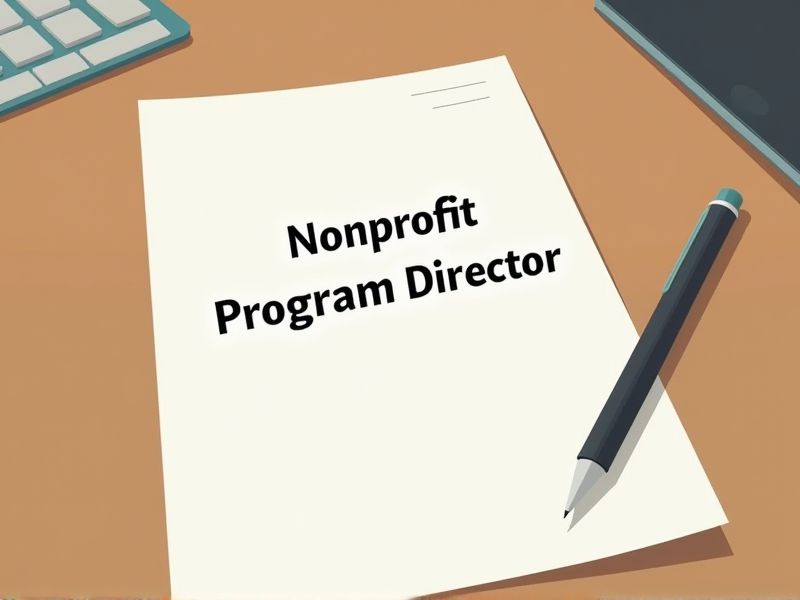
A Nonprofit Program Director plays a crucial role in steering organizational missions and ensuring project success, which requires a strong foundation in leadership and managerial principles. Certain certifications equip directors with essential skills in areas like strategic planning, resource management, and regulatory compliance. Having recognized qualifications can enhance credibility with stakeholders and facilitate effective program execution. Here are some important certifications you may need as a Nonprofit Program Director.
Certified Nonprofit Professional (CNP)
Certified Nonprofit Professional (CNP) equips Program Directors with crucial skills in leadership, financial management, and strategic planning, enhancing their ability to manage nonprofit challenges effectively. The credential signals a standardized level of expertise and commitment, increasing trust among donors and stakeholders. CNP holders gain access to a broad network of professionals, fostering collaboration and innovative solutions. Data indicates that nonprofits led by CNPs often experience greater funding and program success.
Certified Fundraising Executive (CFRE)
A Certified Fundraising Executive (CFRE) credential equips a Nonprofit Program Director with proven fundraising strategies, increasing the likelihood of enhanced donor engagement. The CFRE certification emphasizes ethical standards, ensuring that fundraising practices align with the nonprofit's mission and legal frameworks. With CFRE certification, a director can better assess and implement data-driven decisions, optimizing campaign effectiveness. Investors and stakeholders may view the CFRE credential as a mark of professionalism, potentially increasing trust and investment in the nonprofit.
Project Management Professional (PMP)
A Project Management Professional (PMP) certification equips a Nonprofit Program Director with structured methodologies, enhancing their ability to effectively allocate resources and manage projects under tight constraints. The PMP framework fosters improved stakeholder communication, crucial in a nonprofit setting where multiple interests must be balanced and aligned. By applying PMP principles, a Nonprofit Program Director can better assess risks and develop contingency plans, ensuring program stability despite external funding fluctuations. The standardized approach of PMP helps in measuring program outcomes more accurately, thereby enabling more transparent reporting to donors and stakeholders.
Certified Volunteer Administrator (CVA)
The Certified Volunteer Administrator (CVA) credential enhances a Nonprofit Program Director's ability to effectively manage volunteer resources, which is crucial for maximizing organizational impact. Possessing the CVA increases credibility and trust with stakeholders, which can lead to improved partnerships and funding opportunities. The structured knowledge gained from the CVA certification aids in developing strategic volunteer engagement plans, thereby optimizing the support volunteers provide. Employers often prioritize CVA-certified professionals because research indicates their programs have higher volunteer retention and satisfaction rates.
Grant Professionals Certification (GPC)
Nonprofit Program Directors often engage in fundraising and grant-writing, making the Grant Professionals Certification (GPC) essential for validating their expertise in these areas. Certification enhances the credibility of the director in the eyes of potential funders, increasing the likelihood of successful grant applications. It provides standardized knowledge and skills, promoting more effective and efficient grant management within the organization. This certification also opens up opportunities for professional development and networking within the grant professionals community.
Nonprofit Management Certificate
Having a Nonprofit Management Certificate equips a Nonprofit Program Director with specialized knowledge in areas like fundraising, grant writing, and financial management, which enhances program success. It fosters understanding of legal and ethical standards applicable to nonprofit operations, minimizing risk of compliance issues. The certificate aids in developing leadership and strategic planning skills crucial for guiding teams and projects effectively. It demonstrates commitment to professional development, often increasing credibility and career advancement opportunities within the sector.
Certificate in Strategic Planning for Nonprofits
A Certificate in Strategic Planning for Nonprofits equips a Nonprofit Program Director with essential skills to align organizational goals with practical strategies, enhancing overall impact. This training fosters data-driven decision-making, thereby improving program effectiveness and stakeholder engagement. Acquiring strategic planning expertise helps in securing funding by presenting clear, actionable plans to potential donors. The certificate supports long-term sustainability by instilling adaptive leadership capabilities in a constantly changing nonprofit environment.
Certificate in Financial Management for Nonprofits
Nonprofit Program Directors often manage financial resources without a deep background in finance, leading to potential inefficiencies or financial mismanagement. A Certificate in Financial Management for Nonprofits equips them with essential accounting and budgeting skills, ensuring better financial oversight. This education also enhances their ability to communicate more effectively with financial stakeholders, such as board members and donors. Understanding financial principles allows directors to strategically allocate resources, fostering sustainable organizational growth.
Certified Diversity Executive (CDE)
Having a Certified Diversity Executive (CDE) enhances a Nonprofit Program Director's ability to design inclusive programs that address a diverse beneficiary base. The CDE's expertise in diversity and inclusion helps identify and mitigate biases that may exist within organizational strategies. This role can improve stakeholder engagement and increase the program's credibility, attracting more support and funding. Knowledge in diversity best practices aids in fostering an equitable work environment, which can enhance team collaboration and performance.
Board Governance Professional Certification
A Board Governance Professional Certification equips a Nonprofit Program Director with a comprehensive understanding of legal and ethical responsibilities, enhancing decision-making processes. Nonprofit organizations often grapple with complex regulatory environments; this certification provides directors with the necessary tools to navigate these challenges effectively. Improved governance through certification also builds donor trust, leading to potentially increased funding and support. Furthermore, it fosters strong leadership skills and ensures alignment between program strategies and organizational goals.
Summary
By obtaining certifications, you enhance your credibility, leading to increased trust and support from stakeholders. This increased trust can attract more funding and resources to your nonprofit projects. Certifications equip you with advanced skills, enabling you to design and implement more effective programs. Your ability to showcase improved program outcomes can elevate your nonprofit's status in the community.
